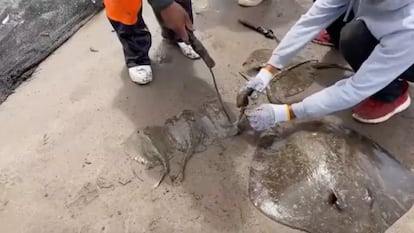Mexican city removes stingers from stingrays to keep tourists happy
Local authorities in Huatabampo were caught on video catching the marine animals and stripping them of their spines

The Mexican city of Huatabampo, in the state of Sonora, has removed stinger spines from stingrays to prevent the animals from stinging tourists during Easter week. In a video shared by animal activists, workers from the local government’s ecology department are seen capturing a stingray, pulling out the spines located in its stinger, and releasing it back into the water. In another video, a Huatabampo City Council worker says that he is removing the spines so that tourists can “swim, have fun, and at the same time, not worry about any accident happening.”
For Raúl Díaz, the director of the marine research institution Cetmar, this sends a “totally wrong message that encourages an unacceptable practice.” Díaz explains that a stingray’s spinal blade, which is located at the end of its tail, is the animal’s “defense mechanism from predators.” “In addition to leaving these fish defenseless from their predators, natural cycles are broken, affecting the marine ecosystem,” he says.
During this season of the year, stingrays — following ocean currents — approach the shores in search of warm waters, which can sometimes lead to incidents with swimmers. As Elsa María Coria, a veterinarian and director of the Wildlife Rescue, Rehabilitation and Research Center (Crrifs) explains, “these animals reproduce once a year, between April and May, when they move to shallow areas with sandy bottoms where the water is warm, and this helps them become sexually mature to reproduce.”
Although stingrays are not typically aggressive, if they are accidentally stepped on, they may react defensively by whipping forward their tails and stinging a person. This is what the Huatabampo authorities said they hoped to avoid by removing the poisonous spines — a decision that was defended on the grounds that stingrays can regrow them.
“When the animal stings, it can lose part of the stinger, which then regenerates. But, if it is done abruptly, with a jerk, it can cause internal damage and even death. We have no idea how many of them survive,” warns Coria.
No impact study was carried out to assess the harm to the stingrays, and there is no official count of how many have been mutilated. In addition to the stress of being captured and handled, the animals were thrown back into the water without any care, says Coria.
Like sharks, stingrays are protected by Official Mexican Standard NOM-029-PESC-2006, and according to the veterinarian, “their care and preservation is important for the balance of the ecosystem.”
“These actions not only threaten marine fauna and the conservation of this species in its natural habitat, but also the balance of the ecosystem,” she adds. “Let’s remember that we are the ones who are invading their home.”
A conservation group filed a complaint over the controversial initiative with the Federal Attorney for Environmental Protection (Profepa), and in response, the mayor of Huatabampo suspended the person responsible for the decision: Elizabeth Guerrero Moreno, the municipal environment coordinator.
But Díaz points out that what happened this year is nothing new. “This is a practice that has been carried out in past years by other administrations. Before 2020, the municipality was already working with the region’s fishermen on this practice, even though there was no permit from a relevant authority to do so.”
“The same thing happened in 2019 and Profepa intervened, but there were no consequences,” adds Coria.
For Coria, the Federal Attorney for Environmental Protection must act accordingly and impose a heavy fine to ensure Huatabampo local authorities do not do it again. ”Even though economic sanctions are imposed, the cultural aspect is also very important in protecting the marine environment, which is why it’s so important to promote other types of values. We need more education and awareness,” says Díaz.
Sign up for our weekly newsletter to get more English-language news coverage from EL PAÍS USA Edition
Tu suscripción se está usando en otro dispositivo
¿Quieres añadir otro usuario a tu suscripción?
Si continúas leyendo en este dispositivo, no se podrá leer en el otro.
FlechaTu suscripción se está usando en otro dispositivo y solo puedes acceder a EL PAÍS desde un dispositivo a la vez.
Si quieres compartir tu cuenta, cambia tu suscripción a la modalidad Premium, así podrás añadir otro usuario. Cada uno accederá con su propia cuenta de email, lo que os permitirá personalizar vuestra experiencia en EL PAÍS.
¿Tienes una suscripción de empresa? Accede aquí para contratar más cuentas.
En el caso de no saber quién está usando tu cuenta, te recomendamos cambiar tu contraseña aquí.
Si decides continuar compartiendo tu cuenta, este mensaje se mostrará en tu dispositivo y en el de la otra persona que está usando tu cuenta de forma indefinida, afectando a tu experiencia de lectura. Puedes consultar aquí los términos y condiciones de la suscripción digital.








































